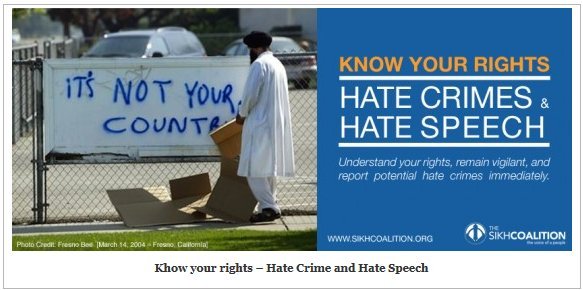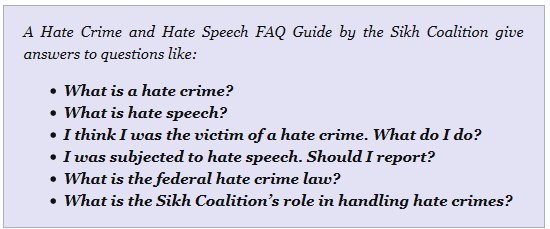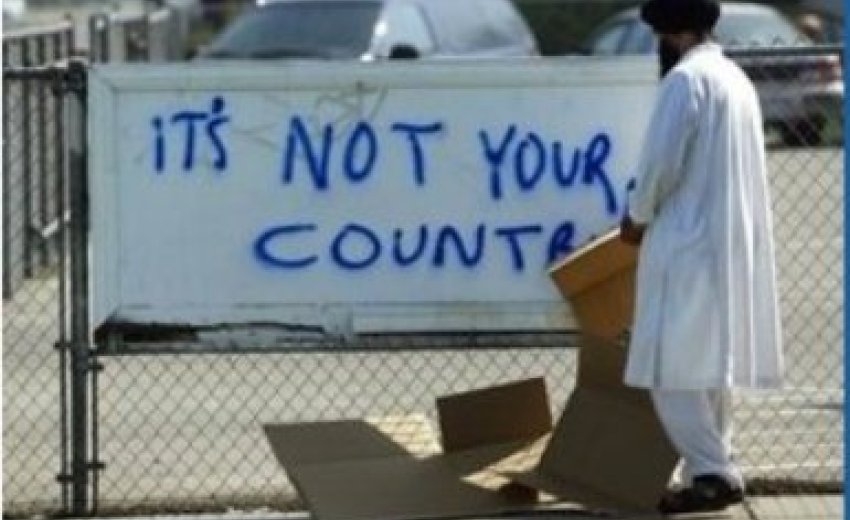|
FAQS on Hate Crimes and Hate Speech
- What is a hate crime?
There are different legal definitions for a hate crime under state and federal laws. Generally, a hate crime
occurs when someone commits a crime against a person or property, motivated in part or because of that
victim's race, religion, national origin, ethnicity, gender, sexual orientation, disability, etc. There are
enhanced legal penalties for offenders who commit hate crimes.
Ex. A turbaned Sikh num is walking dawn the street when a man shouts. "Hey terrorist. Where you
going?" The man then punches the Sikh and tells him to "go back to your country."
This would be an example of a possible hate crime. Based on the facts, it appears the attacker targeted
the victim and committed a crime (assault) because of the victim's actual or perceived race/ethnicity,
religion, and national origin.
In addition to or in the absence of hate speech uttered during an attack, law enforcement will also
examine other factors to determine if an incident was a hate crime. No one piece of evidence is
conclusive. This includes examining the attacker's social media postings, writings, membership in hate
groups, whether s/he has previously committed bias crimes, or made comments to anyone s/he knows
about his/her intentions and thoughts about a group or community, and his/her past history of hate speech
or threats made against the victim.
- What is hate speech?
The First Amendment of the U.S. Constitution protects the right of an individual to utter hateful,
insulting, and offensive words against another person based on his/her race, religion, national origin,
ethnicity, gender, sexual orientation, disability, etc. It is not a crime to hate someone or utter hate
speech, whether online or in person. It could be a crime, however, if offensive words are uttered to incite
imminent violence. It could also be a crime if the hate speech includes threats of harm or violence (i.e.
death threats), whether online, on the telephone, or in person.
Ex. A woman posts on Facebook. “I hate these bearded, brown foreigners and want them out of my country now! America doesti 7 belong to them "
Although hateful, the woman's post is constitutionally protected free speech. (Note, even if legal, it may-
still violate a website's policy.)
Ex. A man shouts to a crowd of shoppers at the grocery store. "Go get that turbaned terrorist! He's a
threat to our country!" in reference to a Sikh shopper. The man leaves the store but the crowd
chases down the Sikh and assaults him.
In this case, the man's hate speech, because it caused an assault, could be considered a hate crime.
- I think I was the victim of a hate crime. What do I do?
If you are the victim of a crime, please first call 911, report the incident to the local police and/or the FBI
immediately, and seek medical attention, if needed.
After you contact the authorities and are safe, we encourage you to report the crime to the Sikh Coalition
(www.sikhcoalition.org/request-legal-assistance. If unable to complete the online form, please call 212-655-3095). For urgent matters, our Iegal team will contact you within one business day to conduct an intake and assess the situation. For all other matters, we will contact you within 1 -3 business days.
- I was subjected to hate speech. Should I still report?
Yes. We urge you to take hate speech seriously and report it to law enforcement, especially if someone
has threatened you with harm or violence. While not every incident of hate speech is a crime or leads to a
crime, it is important to document patterns of verbal or written bias and report accordingly. Hate speech
containing threats of imminent harm to a person or property may be a crime and should always be
reported to law enforcement. You may also report hate speech directly to the Sikh Coalition
(www.sikhcoalition.org/request-legal-assistance. If unable to complete the online form, please call 212-655-3095).
- What is the federal hate crime law?
In 2009. Congress enacted the Matthew Shepard and James Byrd. Jr. Hate Crimes Prevention Act. This
statute. 18 U.S.C. § 249. allows the federal government to investigate and prosecute hate crimes. The
statute makes it a crime for individuals to willfully cause bodily injury, or attempt to cause bodily injury
to any person, because of the actual or perceived race, color, religion, or national origin of any person.
Notably, the statute extends federal protection to crimes motivated by a victim's actual or perceived
gender, sexual orientation, gender identity, and disability. The statute also removed the previous
requirement that the victim be engaging in a federally protected activity at the time of the crime (i.e.
voting or attending school). Now, the federal statute will apply to any crime motivated by bias towards a
protected category regardless of the crime's location.
For more information on federal hate crime laws. please click visitwwwjustice.gov/crt/about/crm/matthewshepard.php. For more information on individual state hate
crime laws, please visit http://archive.adl.org/learn/hate_crimes_Iaws/map_frameset.html.
- What is the Sikh Coalition's role in handling hate crimes?
The Sikh Coalition's Legal Program has assisted numerous Sikhs who have unfortunately been subjected to hate crimes. We continue to be available as a free legal resource to advise you of your rights, navigate the criminal justicc system, push for hate crime investigations/prosecutions where appropriate, and in some cases, provide free legal representation. We have also worked with the criminal justice system in creating innovative restorative justice models to help rehabilitate the hate crime offender and help him/her build a positive relationship with the Sikh community. We are diligent about protecting your rights when an incident of hate occurs and remain the Sikh American community's relentless insurance policy.
To request legal assistance, please contact us at www.sikhcoalition.org/request-legal-assistance.
 |



